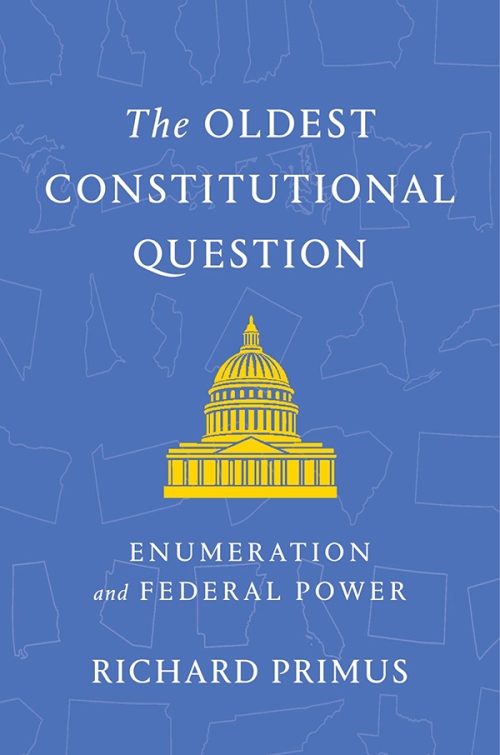In his new book, Michigan Law’s Richard Primus argues against the long-standing orthodoxy that Congress can do only what the Constitution expressly authorizes it to do—and nothing more.
Over the years, Primus, the Theodore J. St. Antoine Collegiate Professor of Law, has taught his students that the 10th Amendment to the Constitution limits the powers of the federal government to those enumerated in Article 1, Section 8, or elsewhere in the Constitution. But he gradually came to question that interpretation.
Here, he discusses the arguments that he lays out in his new book, The Oldest Constitutional Question: Enumeration and Federal Power (Harvard University Press, 2025).
1. The title of your book is The Oldest Constitutional Question. So what is the oldest constitutional question?

This is the issue of federalism. The basic impetus for the writing of the Constitution was the need for a more powerful national government than had previously existed. But how much more powerful and how would it work? We’ve been fighting about the answer to that question ever since.
Central to the way that constitutional lawyers think about this question is the idea that the federal government is a government of enumerated powers. That means that the Constitution affirmatively lists the things that the federal government is authorized to do and the federal government can do those things and no others. This is the opposite default rule from the one for state governments, which can do anything that isn’t affirmatively prohibited.
It is a core proposition of American constitutional law that Congress can legislate only on the basis of its enumerated powers and that that limits Congress in important ways. Also, that federalism—in the way that it’s supposed to work in our system—depends on that limitation.
My book is an explanation of why I think that all of that is wrong.
2. How did you come to question this long-standing orthodoxy?
I started to think it was wrong as I taught the material year after year in the introductory constitutional law course here at Michigan. I would spend several weeks each year teaching about federalism and enumerated powers more or less in the way that I had learned them.
I would explain the significance of the fact that the Constitution enumerates Congressional powers, mostly in Article 1, Section 8, and that the reason there’s a list is to make the point that only what’s on the list is provided. If Congress were supposed to have legislative power in general, you wouldn’t need a long, detailed list.
And I would explain that the 10th Amendment, which is understood to state the rule, says the powers not delegated to the United States by the Constitution are reserved to the states.
But as I taught the material each year, I came to realize that there were a lot of things that didn’t make sense in what I was saying. For example, everyone learns that Congress is limited by its enumerated powers. But you also learn by the end of your first semester in Constitutional Law that, in practice, the enumerated powers haven’t done much work to limit what Congress can actually do in a very long time.
I learned about enumerated powers as a law student, and I believed the conventional view to be correct when I started my career as a law teacher. It took me some number of years of immersion in the material to begin changing my mind.
3. Can you provide an example of how enumerated powers haven’t limited Congress?
As I was in some of the stages of thinking about these issues, the Supreme Court in 2012 decided NFIB [National Federation of Independent Business] v. Sebelius, the first big constitutional challenge to the Affordable Care Act.
It was all about enumerated powers—the leading argument against the Affordable Care Act was, if Congress can compel people to buy health insurance, is there anything left that the enumerated powers don’t reach? What couldn’t Congress legislate, other than the things that the Constitution affirmatively prohibits, like the establishment of a religion? And many people thought that if there wasn’t a clear answer to that question, it had to mean the law was unconstitutional.
That means that, on that theory, the Supreme Court came within one vote of striking down the most ambitious federal social legislation in 50 years. And it’s a bad theory. It doesn’t actually explain how federalism works.
4. Now that you’ve formulated this argument and written this book, what is the next step?
The perspective that I am recommending is radically at odds with the conventional perspective. So one thing that I have to do with it as a teacher is make sure that my students understand the conventional perspective, even though I think it’s wrong. That’s because if you go into a federal court and argue a case in a way that follows from what I am saying about how the Constitution actually works, you will lose your case.
Sometimes competent legal practice requires you to say things that make no sense. But they’re the things that the law has decided are the things that you say. That’s in the short term.
In the longer term, if I can persuade people to think about the Constitution in a better way, maybe we can change what the law thinks is a sensible argument. That is, I think that we should understand the enumerated powers of Congress as primarily intended not to limit Congress, but to empower it.
5. You mentioned that this will require a change in perspective. Why will that need to change?
There are at least two general reasons.
One is that there’s a long tradition in American constitutional law and political culture of being skeptical of federal governance. That attitude draws strength from the idea that it is a faithful channeling of the attitudes of the framers of the Constitution, who were skeptical of central governance.
But I think they weren’t. They wanted a stronger federal government. That was the whole point. And this mechanism of enumerating the federal government’s powers was a way of making sure the federal government would be strong enough, not a mechanism of limiting it by negative implication.
And if we remember it that way, we can have a more positive view of what we, the American people, can accomplish at the level of national government. We’ve actually accomplished a lot of really important things at the level of national government. We became a superpower and the arsenal of democracy; we established Medicare, Medicaid, NASA, the Centers for Disease Control, and many other things that individual states could not accomplish.
The second important change in perspective is about the difference between federalism and the separation of federal powers. Constitutional lawyers think of the enumeration of Congressional powers as an aspect of federalism. But it’s substantially about the separation of powers, too
The powers of Congress were enumerated in substantial part to make clear that it was Congress, not the president, who is supposed to be doing these things. At a time when Congress has ceded a lot of power to the executive branch, I think that’s an important thing to reposition.







